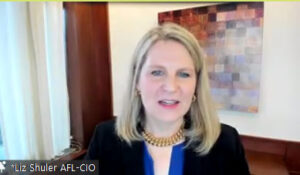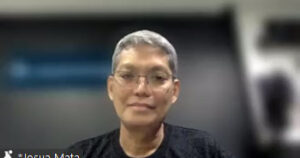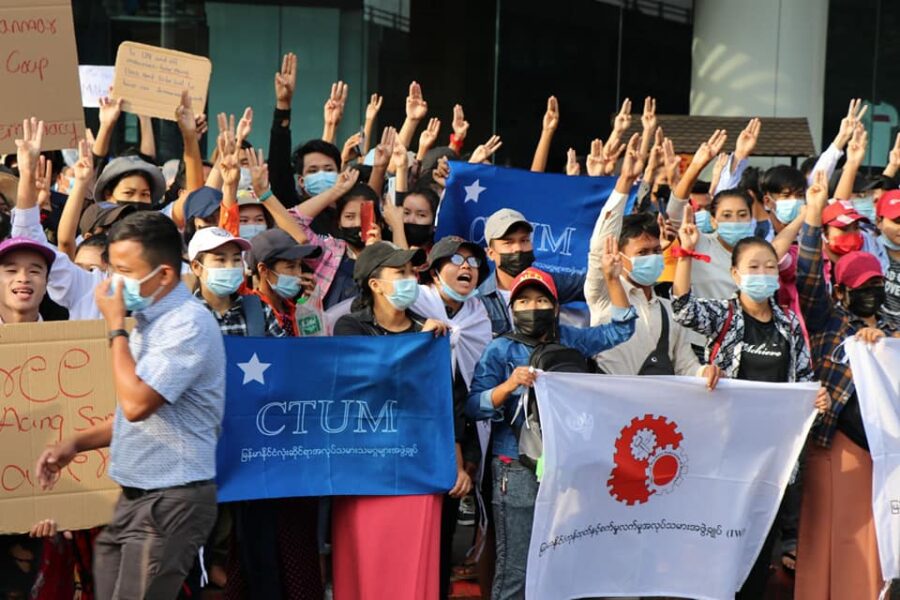Democracy enables workers and their unions to flourish, and as it is increasingly threatened around the world, democracy also depends on working people and their organizations to keep it vibrant, according to speakers at the high-level event, “Worker Organizations’ Vital Role in Democracy.” (Watch for the full recorded session here.)

“We stand with all workers everywhere who are on the front lines of democracy”—AFL-CIO President Liz Shuler. Credit: Solidarity Center
“Threats to democracy go hand-in-hand with threats to workers’ right to form unions,” said AFL-CIO President Liz Shuler, speaking at the November 7 virtual forum. “We stand with all workers everywhere who are on the front lines of democracy in their countries and their workplaces.”
The forum, an official side event of the November 9-10 U.S. Summit for Democracy, brought together union leaders, labor ministers and philanthropic organizations from around the world to highlight the role of worker voice and worker rights as fundamental components of democracy and spur global action in support of freedom of association and collective bargaining.
“Worker Organizations’ Vital Role in Democracy” built on recommendations that emerged from four listening sessions with 250 U.S. government officials and labor leaders from Asia, Africa, the Americas, Europe and the Middle East and North Africa. The Solidarity Center, International Trade Union Organization (ITUC) and the AFL-CIO assisted in organizing the sessions.
“The freedom to form unions is a human right,” said U.S. Labor Secretary Marty Walsh, opening the event. “For global democracy to thrive, the global community must support workers right to independent organizing and bargaining.” In announcing the launch of the Multilateral Partnership for Organizing, Worker Empowerment and Rights (M-POWER) initiative, a year-long efforts by governments, unions and the private sector, Walsh said its goals include extending labor law coverage and strengthening unions.
“When we say workers need a seat at the table, we mean it.”
Democracy Under Threat: The Voice of Workers
During a session exploring worker rights, ITUC General Secretary Sharan Burrow highlighted how economic inequalities—such as the 60 percent of the world’s workers who survive through informal jobs with no rights and no protections—threaten democracy. The ITUC and global labor movement are championing a new social contract, one that includes “Jobs, jobs, jobs, jobs,” said Burrow.
It’s time to return to full employment” with rights and protections for all workers, she said, with a new social contract that includes equality and inclusion for all workers, a push reiterated by International Labor Organization Director General Guy Ryder.

Josua Mata at SENTRO says union members are standing up to brutal assaults on democracy and freedom of association. Credit: Solidarity Center
From the Philippines, Josua Mata, general secretary of the United and Progressive Workers Center (SENTRO), described a bleak environment for workers and their unions, with more than 50 union members killed since 2016 and ongoing redtagging (branding and accusing individuals and/or organizations of being terrorists), illegal firing of union activists and anti-terrorism laws directed at stifling freedom to form unions and bargain.
“Any claim that there is freedom of association in Philippines is a lie,” said Mata. Despite the dangers, he and other union activist there are determined to persist in the struggle for democracy.
“All of this has not stopped us from continuing to do what needs to be done.”
A union leader from Brazil shared her struggle with state corruption. Yet, like Mata, Carmen Foro, general secretary of the Central Union of Workers (CUT) vowed to continue the fight for transparent and free government to enable workers to freely exercise their rights.
“Unions are indispensable to democracy,” said Foro.
In a rallying cry to workers in the United States and around the world, Randi Weingarten, president of the U.S.-based American Federation of Teachers (AFT) said workers must see the struggle to engender and preserve democracy “the same as we would fight for a collective bargaining contract. The fight for democracy is the same as the fight for wages, the fight for dignity.”
Said Solidarity Center Executive Director Shawna Bader-Blau: “No social or political progress happens by magic. Change is pushed by people working collectively. And legitimacy of the government comes from the people.”
Launching a Global Year of Action
Partners in the M-POWER initiative will come together in a year to evaluate progress and recommit to improving worker rights worldwide. Announcing a $100 million pledge by philanthropic organizations through Funders Organized for Rights in the Global Economy (FORGE), Open Society Foundation Executive Director Thomas Periello said the commitment is an important statement for philanthropy to do its part keep worker rights and justice central to its work around the world.”
“As we see rise of threat of authoritarianism around the world, democracies need to deliver, and a huge part of that is free unions,” he said.
Government officials from the U.S. Agency for International Development (USAID), the State Department and Labor Department’s Bureau of International Labor Affairs (ILAB) shared their support of M-POWER’s goals and highlighted the U.S. government’s significant financial commitment to program.
“Governments have a foundational role in providing an enabling role for enabling free and independent unions to thrive,” said Thea Lee, ILAB deputy undersecretary.
Labor ministers from Argentina, Germany, Mexico and Norway also shared how partnerships among union, government and private sector in their countries are enabling workers to reskill and upskill, transfer to jobs in renewable energy and ensure worker rights throughout. “To protect the rights of workers, the first thing we need is a development model to have rights at center,” said Argentina’s Minister of Labor, Employment and Social Security Claudio Moroni.

